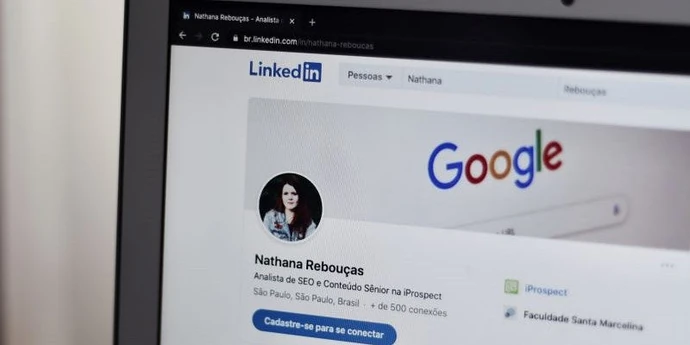Software engineer interviews at Google are known to be quite grueling. The questions are tough, highly specific to Google, and cover a broad range of technical and conceptual topics.
To stand out, you’ll need to show a strong coding foundation, solid system design skills, and a deep understanding of Google’s products and engineering culture.
The good news? With strategic preparation, you can set yourself apart. This guide will walk you through everything you need to know to maximize your chances of landing that coveted software engineering role at Google.
Here's an overview of what we'll cover:
- Role and salary
- Interview process and timeline
- Example interview questions
- Interviewing tips
- Preparation plan
Note that we have separate guides for Google engineering managers, data engineers, and machine learning software engineers, so take a look at those articles if they are more relevant to you.
Click here to practice 1-on-1 with ex-Google SWE interviewers
1. Google Software Engineer Role and Salary ↑
Before we dive into the interview process and questions, let’s quickly cover some basics about the role you’re applying for.
1.1 What does a Google software engineer do?
The software engineer position at Google stands out from SWE roles at other FAANG companies in two key ways:
Google’s software engineering processes are more cautious than they are in a “Move fast” environment, such as Meta. Engineers are urged to work within the company’s strict processes.
You first have to present your idea in a design review and have it approved before you can start working. This often means it takes longer to get things done, but ensures a high-quality product.
Second, the tools available to you at Google and the standard of coding are second to none. The success of Google as an organization is driven by its strong engineering culture, and being part of that is considered a career pinnacle for many engineers.
That also means it’s probably the hardest FAANG+ company to interview for. But don’t worry, follow the advice in this article, and you can give yourself an excellent chance.1.2 Google Software Engineer Salary and Compensation
Google software engineers earn 49% more than the average salary of other software engineers in the US, according to Glassdoor.
Here are the average salaries and compensation for the different software engineer levels at Google. This is based on the reported data from Levels.fyi.
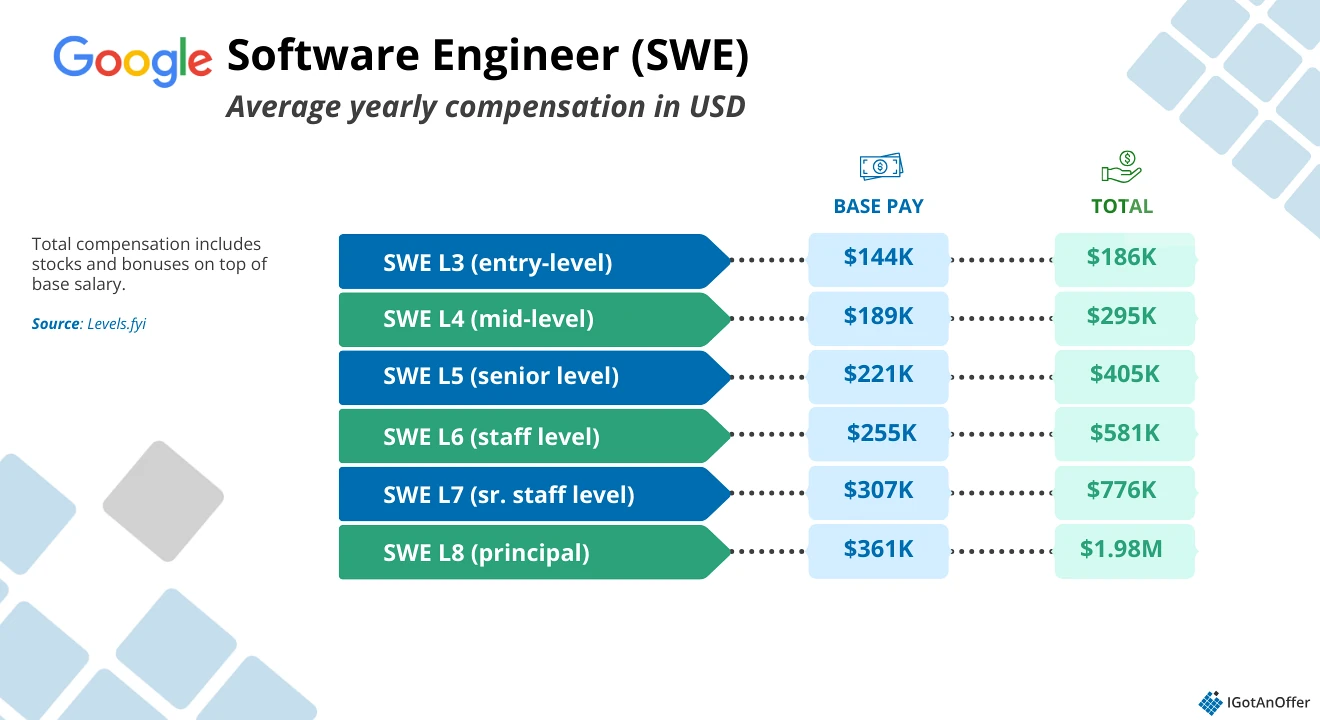
Compensation mainly depends on two key factors: location and level.
- Location: Google US SWEs make ~75% more compared to their counterparts in India. This is based on computations from Glassdoor data.
- Level: The base salary and total compensation go up with each SWE level. Its entry-level position salary is actually the highest among the FAANG companies. But when it comes to L8, Google’s annual salary is surpassed by Meta and Amazon.
Ultimately, your interview performance will largely determine your offer, which is why working with our ex-Google interview coaches can be a smart investment.
And remember, Google compensation is negotiable. If you get an offer, don’t hesitate to ask for more. For tips on how to negotiate, read our Google job offer guide. If you need expert guidance with negotiating, consider booking a session with our salary negotiation coaches.
2. Google Software Engineer Interview Process and Timeline↑
2.1 Steps to expect
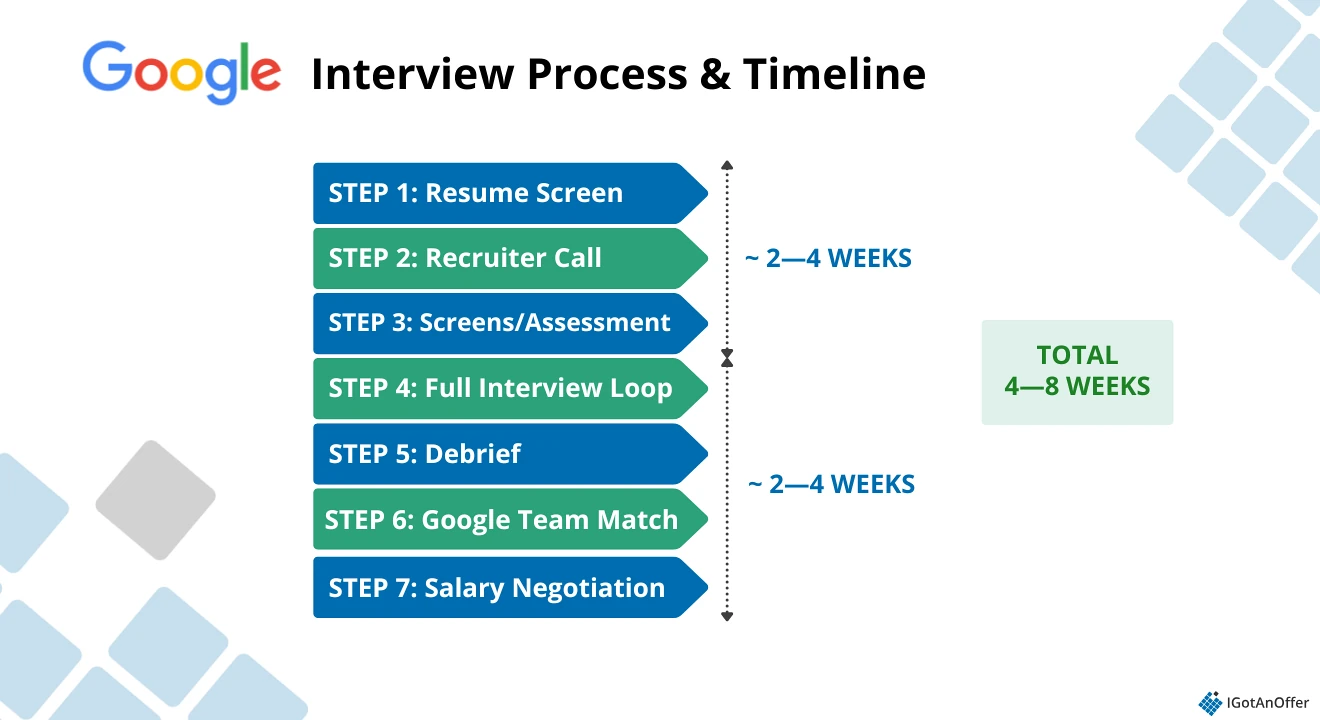
What's the interview process and timeline at Google, specifically for the software engineer role? It usually takes more than eight weeks and follows these steps:
- Resume, cover letter, and referrals
- Recruiter call
- Online assessment(s)
- Technical phone screen: 1 to 2 interviews
- Interview loop: 4 to 6 interviews
Note that the exact process varies slightly from position to position. Your recruiter will send you a PDF at the beginning of the process, which details what interviews you can expect.
Let’s take a look at each step in detail:
2.1.1 Resume screening
First, recruiters will look at your resume and assess if your experience matches the open position. This is the most competitive step in the process—we’ve found that ~90% of candidates don’t make it past this stage.
So take extra care to tailor your resume to the specific position you're applying to. Take a look at our SWE resume, senior SWE resume guide, and Google resume guides for expert tips and real examples.
If you’re looking for expert feedback, get input from our team of ex-FAANG recruiters, who will cover what achievements to focus on (or ignore), how to fine-tune your bullet points, and more.
2.1.2 Online assessments
For the engineering role, Google sends two kinds of online assessments: a general workstyle hiring assessment and a coding assessment.
The hiring assessment is a survey-style behavioral assessment. To prepare, you need to read up on Google’s work culture.
For the coding assessment, you’ll need to brush up on your fundamentals and practice solving coding problems under time pressure. Take a look at our guide to Google online assessments to learn how you can ace this part of the process.
2.1.3 Technical phone screen
If you pass the online coding assessment, you'll be invited to one or two technical phone screens. These will typically last between 45 and 60 minutes each, over Google Meet.
You'll speak to a peer or a potential manager, who’ll ask you to solve data structure and algorithm questions on a shared Google Doc. You won't have access to syntax highlighting or auto-completion like you would in a regular IDE, so practice writing code in Google Docs before your interview.
Finally, in addition to coding questions, you should also be ready to answer a few typical behavioral questions, including "Tell me about yourself," "Why Google?" or "Tell me about a recent project you worked on."
2.1.4 Interview loop
Once you pass the tech screen, your recruiter will schedule an interview loop. This stage typically covers an entire day, with four to six interviews in total. Each interview will last about 45 minutes and cover one of the following topics:
- Coding
- System design (L5 and above)
- Googleyness / leadership (for management positions only)
We’ll look into each topic in greater detail below.
Since 2020, Google has conducted its interviews mostly online, via Google Meet. However, with more candidates using AI tools during interviews, the company has decided to reinstate in-office interviews, “just to make sure the fundamentals are there," Google CEO Sundar Pichai said.
You might be asked to code on a whiteboard or on a device provided by your interviewers on the day of the interview. Either way, check with your recruiter so you can practice with whichever tool you’ll need to use during your interviews.
In addition to interviews, you'll also have lunch with a fellow engineer while you are onsite. This is your opportunity to ask questions about what it's like to work at Google. The company won't be evaluating you during this time, but we recommend that you behave as if they are.
2.2 Differences between SWE levels
For this section, we asked one of our ex-Google SWE coaches, Albert, for insights on the different SWE levels at Google, and the corresponding interview expectations and core responsibilities.
To preface this breakdown, it’s important to note that levels at Google work differently from other companies. Google often downlevels, as its internal titles are not intended to be lateral externally.
“Some candidates may feel discouraged or disappointed when they are told they must interview at a downlevel. It should be understood that this is normal, not the exception,” Albert says.
Therefore, what your interviewers want to see is whether your previous experience and skill sets signal that you would be able to meet the company’s expectations for a particular level.
Let’s get into each level:
Google SWE L4 (mid-level)
- Able to execute completely independently with decent scope projects
- Will need some help in high-level design and working with cross-functional teams
- Expected to drive those cross-functional relationships on their own
- Expected to produce high-quality code and designs
Google SWE L5 (senior)
- Able to execute completely independently in large-scope problems and ambiguity
- Can be given a vague business problem and drive the solution end-to-end
- Expected to showcase mentorship and coaching
- Able to work on projects with large impact and complexity
- Impactful across all teams
Google SWE L6 (staff)
- Where the EM (engineering manager) track and IC (individual contributor) track split
- L6 external hires are rare - only extremely exceptional engineers, even by FAANG standards
- Expected to own extremely large and complex projects
- Have impact on their own team and all sister teams
- Expected to work as a multiplier, accelerating the other engineers on their team
Google SWE L7 (senior staff/principal)
- Another rare external hire
- Have all L6 expectations, but are also expected to have some impact across the entire vertical
- Help manage upwards into executive teams
- Very few L7 engineers under each director, often only one
Google internal and external transfers
If you're currently a Googler looking into switching roles or ladders within the company, the interview guides above will be useful as you prepare for your internal transfer application. To learn more, check out our guide to Google internal transfers.
Same goes if you're from Amazon and looking to transfer to Google. If you want to learn more about making such a career move, check out our article on how to move from Amazon to Google.
2.3 How does Google evaluate applications?
After the onsite rounds, your interviewers grade your performance using a standardized feedback form. It contains your responses to each of the questions, their feedback on your responses, and their final recommendation (e.g., "Strong no hire," "No hire," "Leaning no hire," "Leaning hire," "Hire," "Strong hire").
All feedback forms are combined in a packet, which includes your resume and feedback from the initial phone screens, and it is sent to a third-party hiring committee for review. You’ll be notified when this happens.
Now, who is the hiring committee?
The hiring committee is made up of a group of third-party Googlers who were not present during your interviews. Google uses this committee to make the hiring decision, rather than your interviewers, in order to remove bias from the interview process.
Overall, you’ll be assessed on the four main attributes Google looks for when hiring:
- General cognitive ability. This is often referred to as "GCA" by Googlers. The company wants to hire smart engineers who can learn and adapt to new situations. Here, your interviewer will try to understand how you solve hard problems and how you learn. For more information, take a look at our guide to the GCA interview.
- Role-related knowledge and experience. This is often referred to as "RRK" or "RRKE" internally. The company wants to make sure that you have the right experience, domain expertise, and competencies for the position you're applying for. For more information, take a look at our guide to the RRK interview.
- Leadership. Google looks for a particular type of leadership called “emergent leadership.” You'll typically be working in cross-functional teams at Google, and different team members are expected to step up and lead at different times in the lifecycle of a project when their skills are needed. More information on this guide to Google leadership questions.
- Googleyness (i.e., culture alignment). The company wants to make sure Google is the right environment for you. Your interviewer will check whether you naturally exhibit the company's values, including: being comfortable with ambiguity, having a bias to action, and a collaborative nature. More information on this guide to Googleyness questions.
Your recruiter will notify you when the hiring committee has made a decision. This typically takes one to two weeks after the interview loop.
If you have not received an answer beyond the specified timeline, send a polite check-in to your recruiter to get more information.
There are four general responses that you may receive from Google’s hiring committee:
- You’re hired! Now you just wait to receive your offer package and go through salary negotiations.
- They want you on board, but have to find a team match first.
- They need more information about you. They might schedule 1 or 2 more interviews, after which the hiring committee will reconvene to make a decision.
- You get rejected. Try not to be too disappointed; many candidates get in after multiple attempts. Read our article on Google rejection and get ready to try again in a few months.
3. Google Software Engineer Interview Questions ↑
We believe in data-driven interview preparation and have used Glassdoor data to identify the types of questions which are most frequently asked at Google.
For coding interviews, we've broken down the questions you'll be asked by subcategories so that you can prioritize what to study and practice first. For system design and behavioral questions, we've listed questions that were frequently reported on Glassdoor and other resources.
3.1 Coding interview questions
Google software engineers solve some of the most difficult problems the company faces with code. To qualify, you need to have strong problem-solving skills, regardless of level.
In this part of the interview, you want to show that you think in a structured way and write code that's accurate, bug-free, and fast.
According to Google SWE candidates on Glassdoor, Google typically gives Leetcode-style coding problems. They tend to level up in difficulty as you progress through the interview process.
This means you could expect easy LC questions during your online assessment and then move on to medium to difficult coding problems in your phone screens and onsite interviews.
The general advice is to practice with the top 50 latest Google-tagged problems on Leetcode. Google also sends review materials and has a whole page dedicated to practice coding questions.
Based on our analysis of the 100 most recent SWE coding questions reported on Glassdoor, here are the most commonly asked coding topics at Google. We’ve also included the frequency they’re asked.
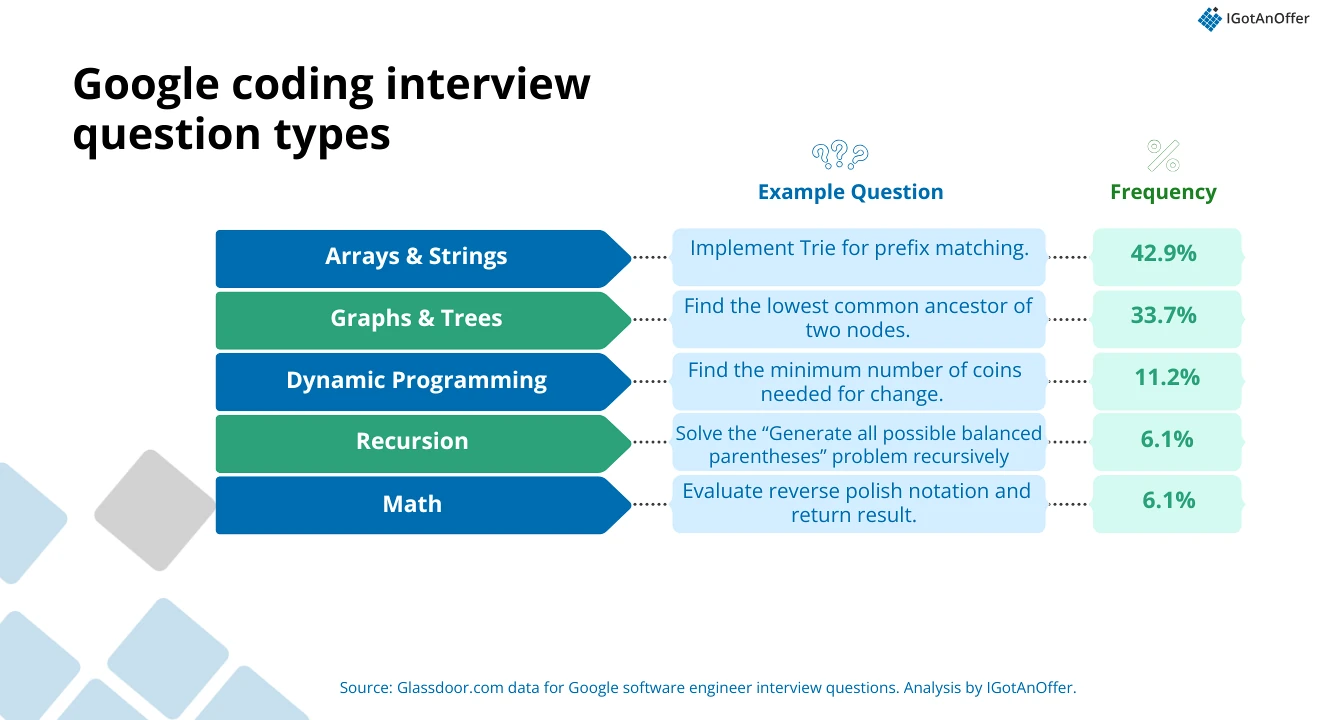
Below, we've listed common examples used at Google for each of these different question types. To make these questions easier to study, we've modified the phrasing to match the closest problem on Leetcode or another resource, and we've linked to a free solution.
Google SWE example coding questions
Arrays & Strings
- Implement Trie for prefix matching (Solution)
- Write a function to merge two sorted arrays without using extra space (Solution)
- Given an array of integers, return all unique triplets [a, b, c] where a + b + c = 0. Ensure no duplicate triplets in the output. (Solution)
- Write a function that prints out every permutation of 1s and 2s that add up to a number n. (Solution)
- Implement a Snapshot Array that supports pre-defined interfaces (note: see link for more details). (Solution)
Graphs & Trees
- Implement a cleaning algorithm for a robot vacuum cleaner that doesn't know its position within the room. (Solution)
- Write a code to construct a binary tree that is a mirror of the given binary tree. (Solution)
- Find the lowest common ancestor of two nodes (Solution)
- Write a function to detect cycles in a directed graph. How would you optimize a database query to improve runtime? (Solution)
- Given a binary tree, find the maximum path sum. The path may start and end at any node in the tree. (Solution)
Dynamic Programming
- Given two strings text1 and text2, return the length of their longest common subsequence. If there is no common subsequence, return 0. (Solution)
- Find the minimum number of coins needed for change. (Solution)
- Non-overlapping intervals (Solution)
- Given a matrix and a target, return the number of non-empty submatrices that sum to target. (Solution)
- Given a rows x cols binary matrix filled with 0's and 1's, find the largest rectangle containing only 1's and return its area. (Solution)
Recursion
- Solve the "Generate All Possible Balanced Parentheses" problem recursively. (Solution)
- Reverse a linked list (Solution)
- A strobogrammatic number is a number that looks the same when rotated 180 degrees (looked at upside down). Find all strobogrammatic numbers that are of length = n. (Solution)
- Given a binary tree, find the length of the longest path where each node in the path has the same value. This path may or may not pass through the root. The length of path between two nodes is represented by the number of edges between them. (Solution)
- Given the root node of a binary search tree, return the sum of values of all nodes with value between L and R (inclusive). The binary search tree is guaranteed to have unique values. (Solution)
Math
- Evaluate reverse polish notation and return result (Solution)
- How to connect nodes that randomly appear (Solution)
- A group of two or more people wants to meet and minimize the total travel distance. You are given a 2D grid of values 0 or 1, where each 1 marks the home of someone in the group. The distance is calculated using Manhattan Distance, where distance(p1, p2) = |p2.x - p1.x| + |p2.y - p1.y|. (Solution)
- You are given two non-empty linked lists representing two non-negative integers. The digits are stored in reverse order, and each of their nodes contains a single digit. Add the two numbers and return them as a linked list. (Solution)
Check out our guide to Google coding interviews to get more practice questions and Google-specific insights and information.
3.2 System design interview questions
Many of Google’s products, such as Google Search, Gmail, Google Docs, Android, and YouTube, all have 1bn+ monthly active users. Google engineers, therefore, need to be able to design systems that are highly scalable and performant.
If you’re being considered for a mid-level position, expect a system design interview round. The rule of thumb is, the more senior you are, the more system design questions you’ll get.
Here’s a quick look at system design interview expectations per level, with insights from FAANG SWE coach, Xiao.
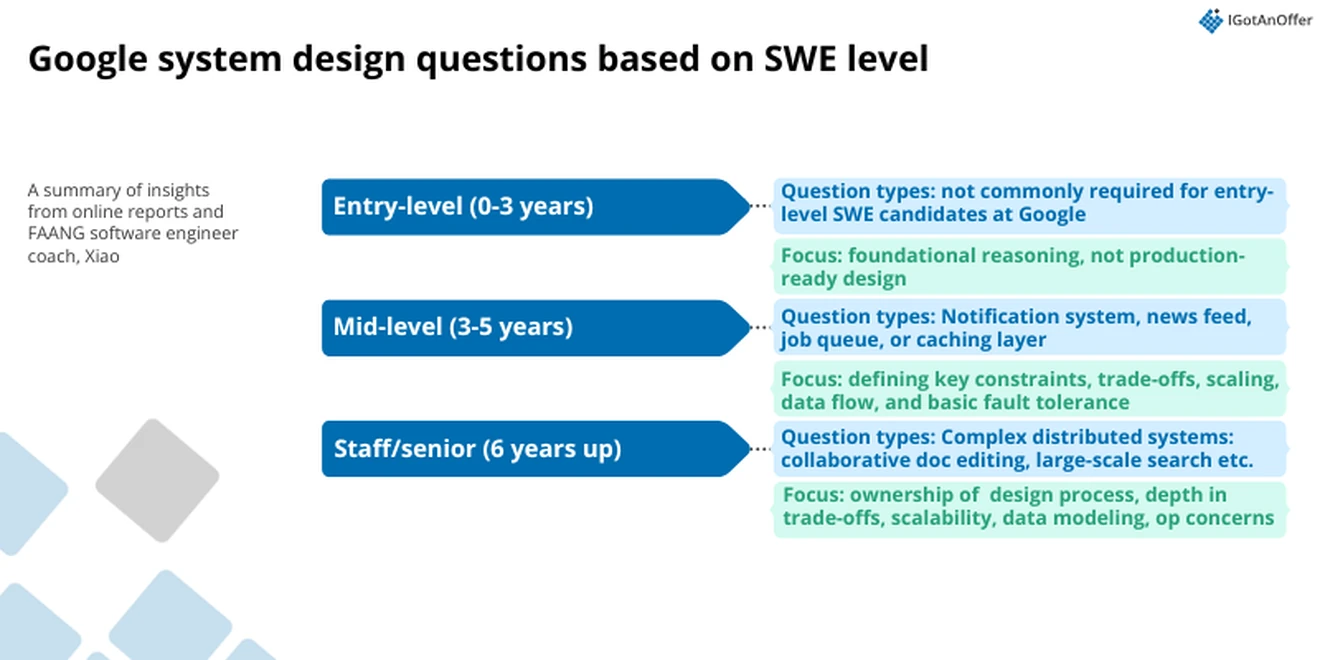
The coding questions we've covered above usually have a single optimal solution. But the system design questions you'll be asked are typically more open-ended and feel more like a conversation.
In most cases, your interviewer will adapt the question to your background. For instance, if you've worked on an API, they'll ask you to design an API. But that won't always be the case, so you should be ready to design any type of product or system at a high level.
In this part of the interview, you want to show that you can both be creative and structured at the same time.
Here are the most common system design questions asked in the Google interview reports on Glassdoor.
Google SWE example system design questions
- How would you design Google's database for web indexing?
- How would you design Google Docs?
- How would you design Google Search?
- How would you design Google Home (voice assistant)?
- How would you design Amazon's book preview?
- How would you design a social network?
- How would you design a task scheduling system?
- How would you design a ticketing platform?
- How would you design a system that counts the number of clicks on YouTube videos?
- How would you design a webpage that can show the status of 10M+ users including: name, photo, badge, and points?
- How would you design a function that schedules jobs on a rack of machines, knowing that each job requires a certain amount of CPU & RAM, and each machine has different amounts of CPU & RAM? Multiple jobs can be scheduled on the same machine as long as it can support them.
Check out our guide to Google system design interviews to get more practice questions and Google-specific insights. If you’re interviewing for an ML-focused SWE role, you’ll find even more relevant information in our ML system design guide.
3.3 Googleyness, behavioral, and leadership interview questions
The last type of interview you can expect as a Google SWE candidate is a Googleyness and behavioral interview. During this interview, you may get a mix of behavioral and hypothetical questions, designed to evaluate your alignment with Google’s values and general motivational fit for the role.
Know that interviewers give a special focus on Googleyness, so it may help to familiarize yourself with this unique cultural attribute.
You’ll find that the definition of Googleyness is quite nebulous, at least compared to other companies like Amazon with its Leadership Principles. That’s by design.
According to ex-Google SWE Albert, “Google is different in that all interviewers can leave good or bad feedback related to Googleyness, and it’s something constantly being evaluated.” This is why some have referred to Googleyness as “culture add” rather than “culture fit”.
In addition, if you're interviewing for management or senior positions (e.g., engineering manager), you'll also usually have leadership interviews where you'll be assessed on your ability to lead people and spearhead projects.
We've listed five standard non-coding interview questions that Google tends to ask all software engineers below, and an additional 20 you should prepare for if you're targeting a management or senior position.
Google SWE example behavioral questions
For all software engineers
- Tell me about yourself
- Why Google?
- Tell me about a recent / interesting project you worked on
- Tell me about a time you had to resolve a conflict in a team
- What is your favorite Google product?
For management and leadership positions
People management interviews
- Tell me about a time you had to handle a project that was late
- Tell me about a time you had to handle trade-offs and ambiguity
- Tell me about a time you were part of an organization in transition and how you helped them move forward
- Tell me about a time you led a team through a difficult situation
- Tell me about a time you developed and retained team members
- How would you deal with a team challenge in a balanced way?
- How would you address a skill gap or personality conflict?
- How would you ensure your team is diverse and inclusive?
- How would you organize day-to-day activities?
- How would you convince a team to adopt new technologies?
Project management interviews
- Tell me about a time you demonstrated leadership even though you weren't the formal manager
- Tell me about a time you were the end-to-end owner of a project
- Tell me about a time you used data to make a critical decision
- Tell me about a time you used data to measure impact
- How would you handle competing visions on how to deliver a project?
- How would you choose a methodology to manage a project?
- How would you balance flexibility and process in an agile environment?
- How would you handle projects without defined end dates?
- How would you prioritize projects of varying complexity?
- How would you balance process vs. execution in an agile environment?
For more information, check out our articles on Google behavioral interviews, Google hypothetical interviews, and Googleyness and leadership interviews.
4. Google Interviewing Tips ↑
Being a fantastic software engineer won’t necessarily be enough to ace your interviews at Google. Interviewing is a skill in itself that you need to learn and hone.
Let’s look at some key tips to make sure you approach your interviews in the right way.
4.1 Ask clarifying questions
Often, the questions you’ll be asked will be quite ambiguous, so make sure you ask questions that can help you clarify and understand the problem. Most of the questions will focus on testing your technical proficiency.
4.2 Communicate efficiently
During your technical interviews, you’ll also be assessed on your communication skills and how you talk through your problem-solving process. Use this as your opportunity to show how well you communicate and collaborate with colleagues by treating your technical interviews like a conversation.
For example, in coding interviews, Google recommends that you talk as you code so the interviewer can follow your reasoning.
In system design interviews, start by stating your assumptions to make sure you’re aligned with your interviewer.
And in behavioral interviews, set up your situation quickly before diving into your actions and results.
A great way to improve this skill is to familiarize yourself with answer frameworks, such as IGotAnOffer’s SPSIL framework (Situation, Problem, Solution, Impact, Learning) for behavioral interviews, or the 4-step system design framework we recommend to candidates for tackling system design questions.
4.3 Scope the problem and state your assumptions clearly
During your design interview, you will likely be asked to design large-scale systems like Spotify or YouTube. Since this can be impossible in around 45 minutes, it’s important to scope out the problem first.
Start by clarifying the requirements with your interviewer. Then, clearly state your assumptions and check with your interviewer to see if those assumptions are reasonable.
4.4 Present multiple possible solutions
When you code, present multiple possible solutions if you can. Google wants to know your reasoning for choosing a certain solution.
4.5 Center on Google’s values
Make sure to review Google’s core values and align your behavioral responses with them. Prepare anecdotes/concrete examples from your professional experience corresponding to each Google core value. To be more efficient, adapt your stories so they can respond to different values.
4.6 Brute force, then iterate
When solving a coding problem or designing a system, don’t necessarily go for the perfect solution straight away. Google recommends that you first try and find a solution that works, then iterate to refine your answer.
Keep your code simple–if you can’t explain it in 5 minutes, it might be too complex.
4.7 Keep your code organized
Make sure to keep your code organized so your interviewer won’t have a hard time understanding what you’ve written. Google wants to see that your code has captured the right logical structure.
4.8 Get comfortable with coding on various mediums
Google typically asks interviewees to code on a shared Google Doc if the interview is done online. If the interview is in person, you might be asked to code on a Chromebook or a whiteboard.
You can check with your recruiter which one it will be if you’re not sure which medium to use.
4.9 Be honest
Google does not expect its candidates to know everything, so if you get a question that’s outside of your expertise, don’t hesitate to let your interviewer know. Ask the right questions and show motivation to learn.
Similarly, when asked if you faced challenges or setbacks, don’t deny or frame your weakness as a strength. Instead, discuss how you’ve improved and learned from these challenges.
5. Preparation Plan ↑
Now that you know what questions to expect, let's focus on how to prepare.
It's no secret that the performance bar at Google is high. Some people even go as far as quitting their jobs to prepare for interviews full-time.
This is extreme and not what we recommend doing, but it shows how much effort some candidates are ready to put in. We've coached more than 20,000 people for interviews since 2018. Below, we list our recommended four steps to prepare as efficiently as possible.
5.1 Learn more about Google
Most candidates fail to do this. But before investing tens of hours preparing for an interview at Meta, you should take some time to make sure it's actually the right company for you.
Google is undoubtedly prestigious, so it’s tempting to ignore this step. But in our experience, the prestige in itself won't make you happy day-to-day. It's the type of work and the people you work with that will.
If you know engineers who work or used to work at Google, it's a good idea to talk to them to understand what the culture is like. In addition, we would recommend reading the following:
- Google's mission statement (by Google)
- Google's values (by Google)
- Google strategy teardown (by CBS Insights)
- Google’s engineering culture (by The Pragmatic Engineer)
- Google Developers Blog (by Google)
- Google engineering practices (GitHub)
5.2 Practice by yourself
As we've outlined above, you'll have to prepare for several different categories of questions ahead of your Google SWE interviews.
As a starting point, be sure to check out Google’s official interview resources. There, you can find links to mock coding and system design interviews, technical interview prep tips, and other articles featuring real Googlers and what they do.
In this article, we've recommended various deep-dive articles that will help you prepare for each question category. Here's the complete list, plus a couple of extras we think could be useful.
- Google coding interview
- Google system design interview
- Machine learning system design interview
- "Why Google?" interview question
- Google behavioral interview questions
- Googleyness and leadership interview questions
- General cognitive ability (GCA)
- Role-related knowledge (RRK)
As you start prepping, it would be good to start tracking your progress. Here are two checklists you can use as is or modify based on your needs:
- Coding checklist (by ex-Google SWE Himanshi)
- System design checklist
Click here to know if you’re ready for a FAANG interview.
Once you’ve brushed up on the different topics and familiarized yourself with the questions, practice by interviewing yourself out loud.
This may sound strange, but it will significantly improve the way you communicate your answers during an interview. Play the role of both the candidate and the interviewer, asking questions and answering them, just like two people would in an interview.
However, by yourself, you can’t simulate thinking on your feet or the pressure of performing in front of a stranger. Plus, there are no unexpected follow-up questions and no feedback.
That’s why many candidates try to practice with friends or peers.
5.3 Practice with peers
If you have friends or peers who can do mock interviews with you, that's an option worth trying. It’s free, but be warned, you may come up against the following problems:
- It’s hard to know if the feedback you get is accurate
- They’re unlikely to have insider knowledge of interviews at your target company
- On peer platforms, people often waste your time by not showing up
For those reasons, many candidates skip peer mock interviews and go straight to mock interviews with an expert.
5.4 Practice with experienced SWE interviewers
In our experience, practicing real interviews with experts who can give you company-specific feedback makes a huge difference.
Find a Google software engineer interview coach so you can:
- Test yourself under real interview conditions
- Get accurate feedback from a real expert
- Build your confidence
- Get company-specific insights
- Learn how to tell the right stories, better.
- Save time by focusing your preparation
Landing a job at a big tech company often results in a $50,000 per year or more increase in total compensation. In our experience, three or four coaching sessions worth ~$500 make a significant difference in your ability to land the job. That’s an ROI of 100x!








